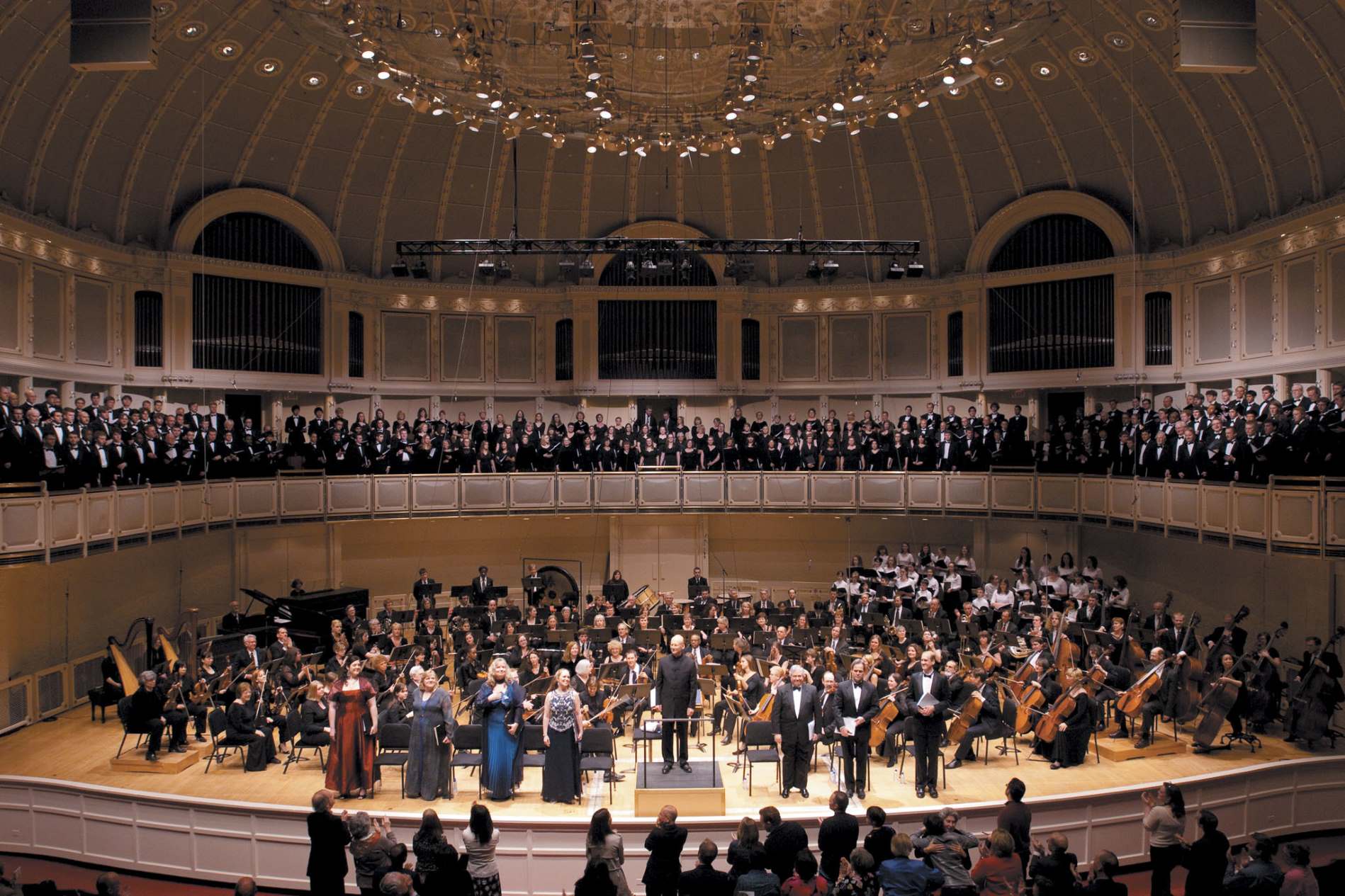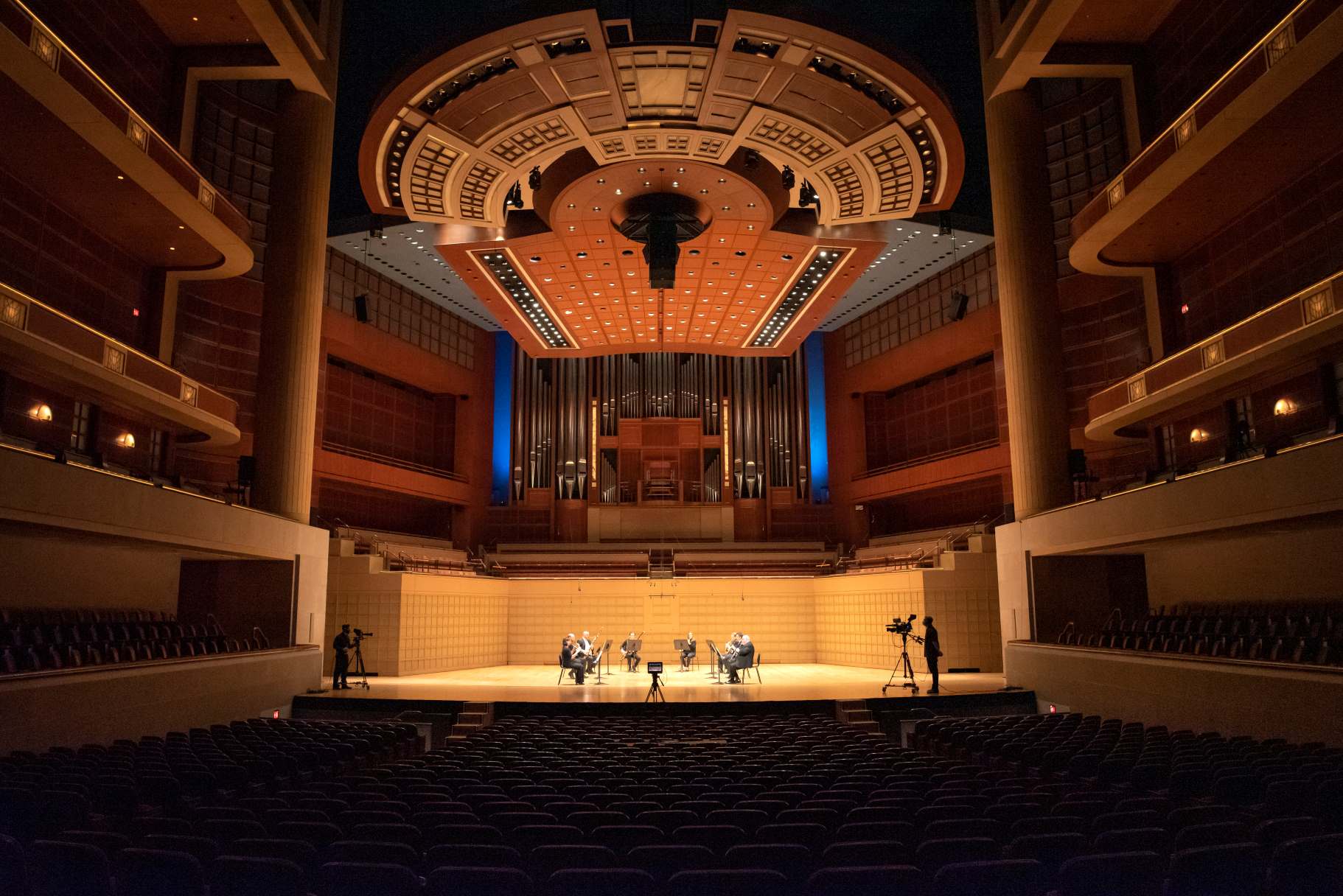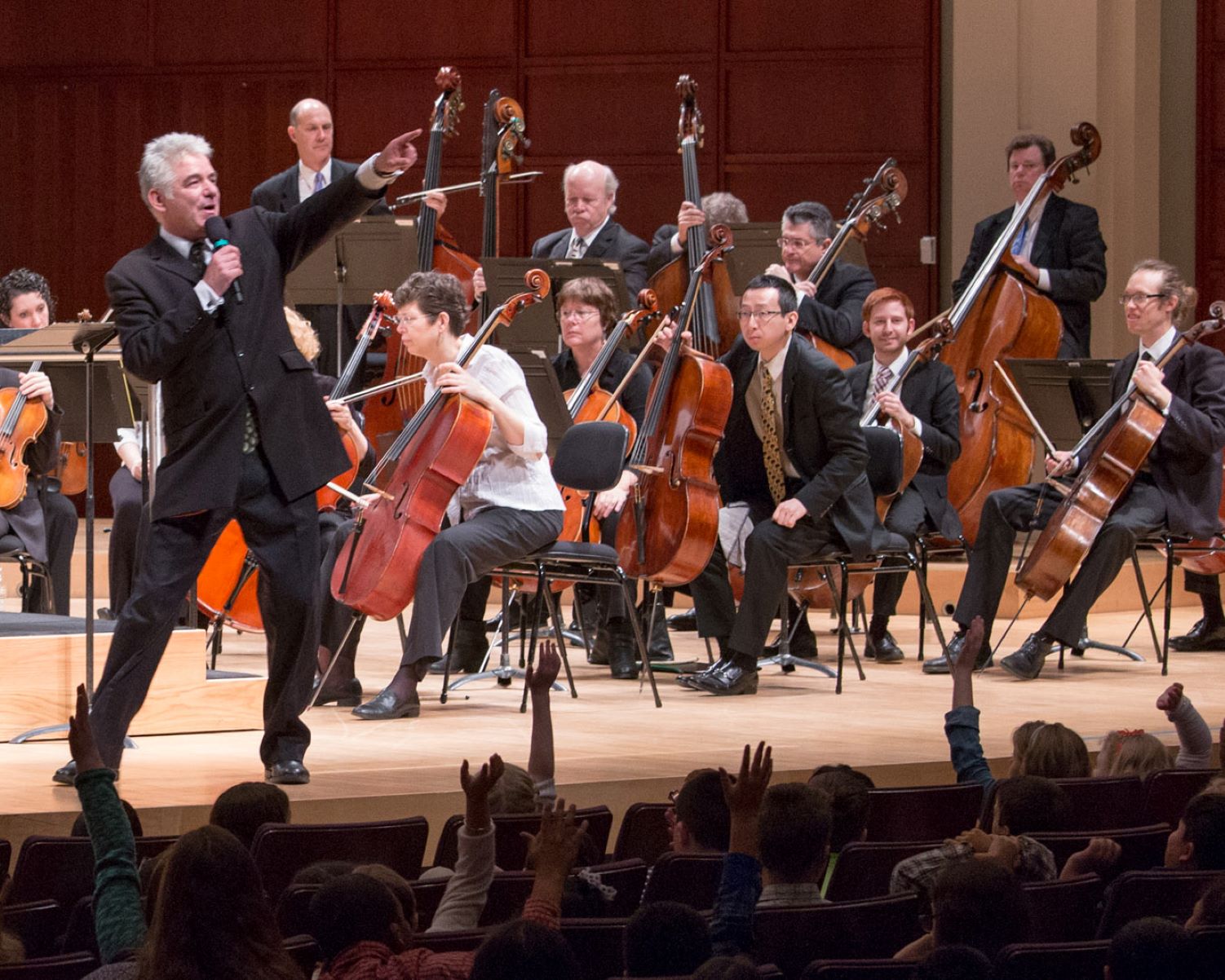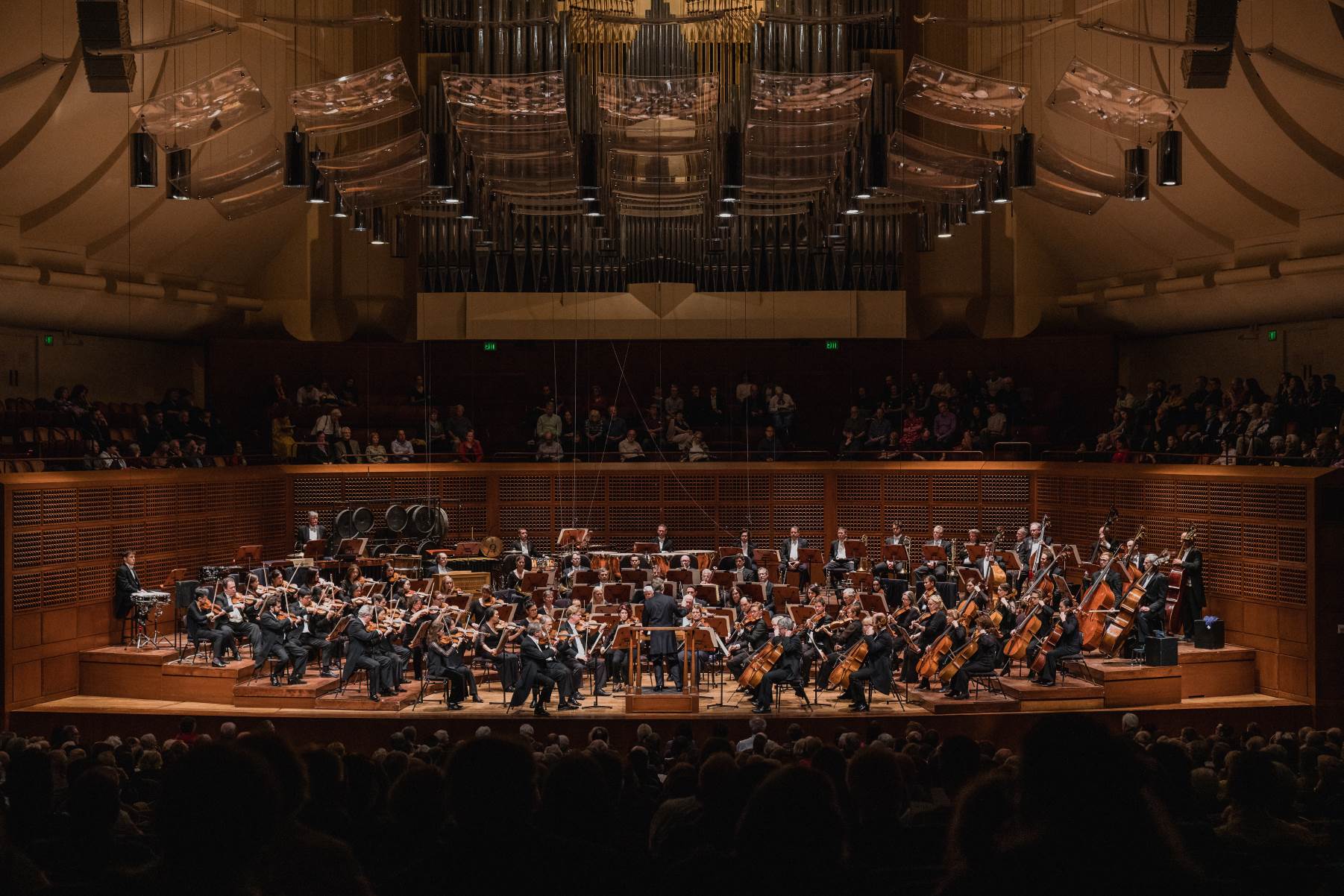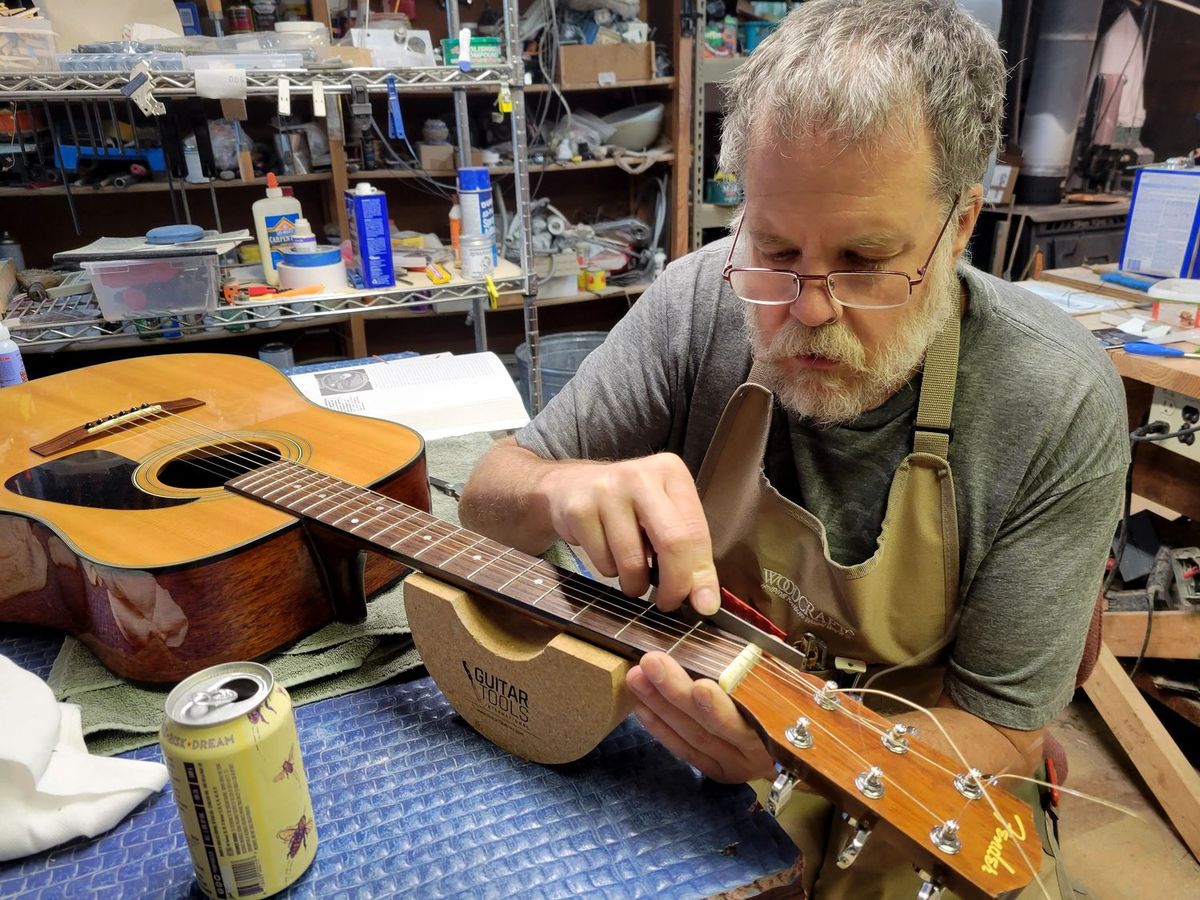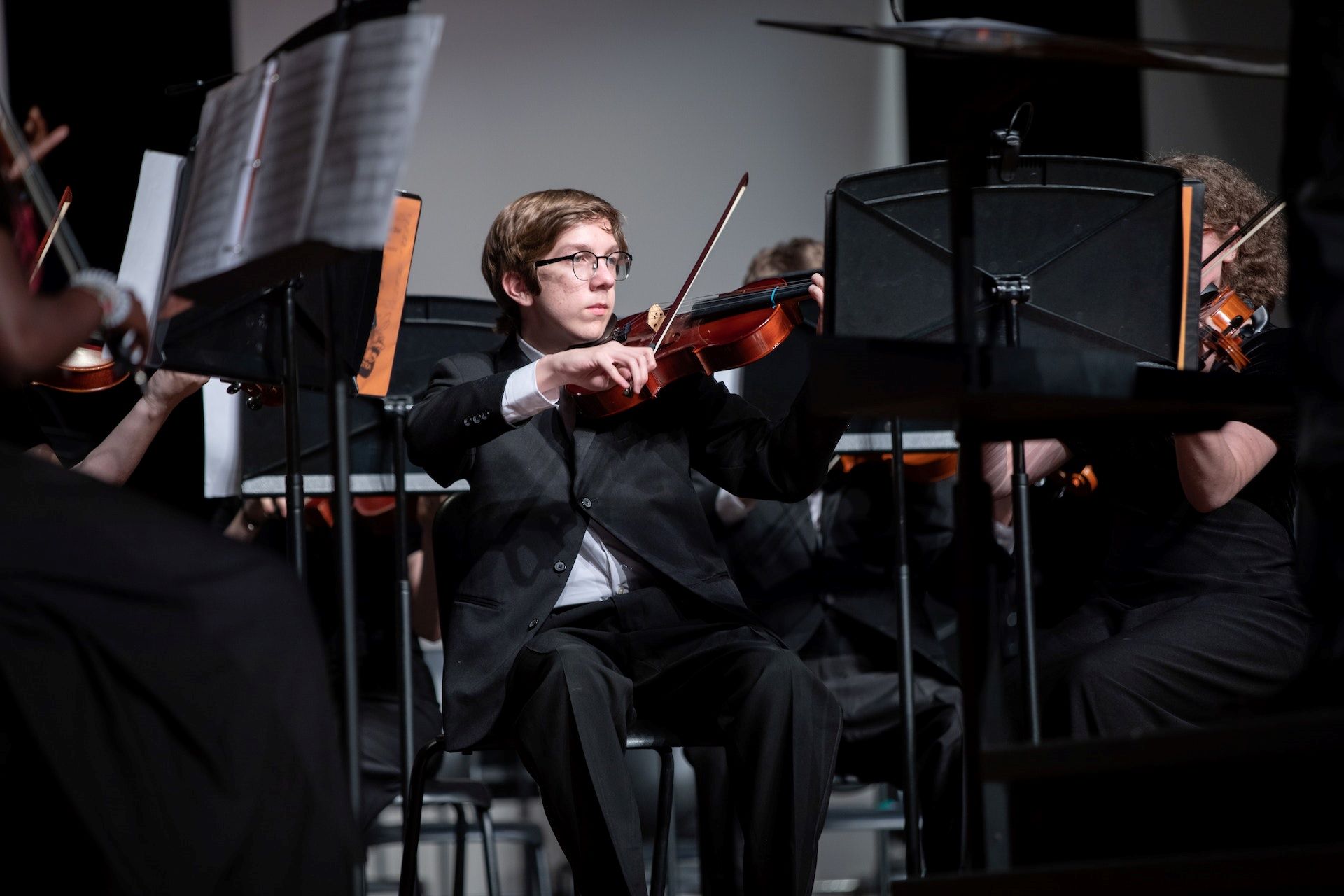

Symphony
How To Become A Musician Of Symphony
Modified: February 24, 2024
Learn how to become a talented musician of the symphony orchestra and make your mark in the world of classical music. Embrace the rich harmonies and enchanting melodies of symphony.
(Many of the links in this article redirect to a specific reviewed product. Your purchase of these products through affiliate links helps to generate commission for AudioLover.com, at no extra cost. Learn more)
Table of Contents
- Introduction
- Finding Your Instrument
- Learning to Play
- Music Theory and Sight-Reading
- Joining Music Lessons or Ensembles
- Developing Your Skills
- Performing in Auditions
- Networking and Making Connections
- Pursuing Further Education
- Finding Opportunities to Perform
- Dealing with Rejection and Failure
- Staying Motivated and Persistent
- Maintaining a Healthy Lifestyle for Optimal Performance
- Balancing Music and Personal Life
- Seeking Mentors and Role Models
- Embracing Continuous Learning and Growth
- Conclusion
Introduction
Welcome to the world of symphony music! The captivating melodies, the harmonious blend of instruments, and the sheer power of a full orchestra coming together – it’s an experience like no other. If you’ve ever dreamed of being a part of this magical world, then you’ve come to the right place.
Becoming a musician in a symphony requires dedication, discipline, and a lot of hard work. It’s a journey that is both challenging and rewarding, but with the right passion and determination, anyone can embark on this musical adventure.
In this article, we will guide you through the steps to becoming a musician in a symphony. From finding your instrument to developing your skills, from navigating auditions to networking with fellow musicians, we will cover it all. Whether you’re a beginner just starting out or an intermediate musician looking to take your talent to the next level, this guide will provide valuable insights and tips to help you along the way.
But before we dive into the specifics, it’s important to understand what a symphony is. A symphony is a musical composition for a full orchestra, typically consisting of four movements. It is a large-scale work that showcases the talents of multiple instrumentalists working together in harmony.
Being a musician in a symphony is not just about playing an instrument; it’s about becoming part of a collective effort to create something truly extraordinary. It requires teamwork, precision, and a deep understanding of the music you’re playing. It’s a constant pursuit of excellence and a lifetime of honing your craft.
So, if you’re ready to embark on this incredible journey, let’s begin by finding the instrument that resonates with your soul and sets the stage for your symphony career.
Finding Your Instrument
When it comes to becoming a musician in a symphony, the first step is to find an instrument that speaks to you. Whether you have a natural affinity for a particular instrument or have always been drawn to a specific sound, choosing the right instrument is essential to your journey as a symphony musician.
Begin by exploring different types of instruments and listening to various symphony performances. Pay attention to the sounds produced by different instruments and how they blend together in an orchestra. Consider your personal preferences and the emotions you connect with each instrument’s sound.
Experiment with playing different instruments if possible. Visit a music store or an instrument rental service and try your hand at playing a few notes on instruments that intrigue you. This hands-on experience can give you a better sense of how comfortable you feel playing a certain instrument and how well it suits your musical aspirations.
If you’re still unsure which instrument to choose, consider consulting with a music teacher or a symphony musician. They can provide valuable insights based on their experience and help you make a more informed decision.
Remember, the instrument you choose will be your musical companion for years to come. It will be the vehicle through which you express your emotions, tell stories, and create beautiful music. So, take your time in finding the instrument that resonates with your soul and ignites your passion for the symphony.
Learning to Play
Once you have chosen an instrument to pursue, the next step is to learn how to play it. Learning to play an instrument is a journey that requires patience, practice, and a commitment to continuous improvement.
One of the best ways to begin your musical journey is by finding a qualified music teacher or instructor. They will guide you through the fundamentals of playing your chosen instrument, teaching you proper technique, hand position, and musical expressions.
In addition to private lessons, consider joining a music school or program that offers group lessons. This will not only provide you with a structured curriculum but also give you the opportunity to interact with other aspiring musicians and learn from each other’s experiences.
Practice is key to mastering any instrument. Set aside dedicated time each day to practice playing your instrument. Start with simple exercises and gradually progress to more complex pieces as you gain confidence. Remember that consistent practice, even in small increments, is more effective than sporadic, lengthy sessions.
To complement your instrumental practice, it’s also important to develop your overall musicianship. This includes learning music theory, understanding different musical styles and genres, and developing ear training skills. These skills will enhance your ability to interpret and perform music with depth and precision.
Don’t forget to explore different genres of music beyond the symphony repertoire. This will broaden your musical horizons and enrich your playing style. Experiment with solos, improvisation, and exploring different techniques to add your unique touch to the music you play.
Learning to play an instrument is a humbling experience that requires perseverance and resilience. Stay motivated by setting goals for yourself – whether it’s learning a challenging piece, mastering a specific technique, or performing in front of an audience. Celebrate your accomplishments along the way and take pleasure in the progress you make.
Remember, learning to play an instrument is not just about the end result of performing in a symphony; it’s about the joy of expressing yourself through music and the journey of self-discovery that comes with it.
Music Theory and Sight-Reading
As you develop your skills as a musician, it is crucial to understand music theory and hone your sight-reading abilities. Music theory provides the foundation for understanding how music works, while sight-reading allows you to perform music on the spot without prior preparation. Both of these skills are essential for symphony musicians.
Music theory encompasses concepts such as notation, scales, chords, harmony, rhythm, and form. It helps you analyze and interpret musical compositions, giving you a deeper understanding of the music you play. By studying music theory, you can better communicate and collaborate with fellow musicians, identify patterns in music, and make informed musical decisions.
There are various resources available to learn music theory, including books, online courses, and tutorials. Seek guidance from your music teacher or connect with fellow musicians who can share their knowledge and experiences. As you delve into music theory, try to apply the concepts you learn to your instrument, incorporating them into your practice and performance.
Sight-reading is the ability to read and perform music in real-time, without prior rehearsal. In the symphony context, this skill is particularly important, as musicians often encounter new and unfamiliar music during rehearsals and performances. Sight-reading allows you to quickly adapt to new pieces, ensuring a smooth and cohesive performance with the rest of the ensemble.
To improve your sight-reading skills, regularly practice reading music from different genres and difficulty levels. Start with simple pieces and gradually increase the complexity as you become more comfortable. Focus on note recognition, rhythm, dynamics, and articulation while maintaining a steady tempo. Utilize sight-reading exercises and participate in sight-reading workshops or classes to further refine your abilities.
Remember, music theory and sight-reading are complementary skills that will enhance your overall musicianship. By understanding the structure and elements of music and being able to read and interpret notation, you will become a more versatile and confident symphony musician.
Joining Music Lessons or Ensembles
One of the most effective ways to accelerate your growth as a symphony musician is by joining music lessons or ensembles. These experiences provide you with the opportunity to learn from experienced professionals, collaborate with fellow musicians, and gain practical performance experience.
Music lessons, whether private or group-based, offer guidance tailored to your specific instrument and skill level. Working with a qualified music teacher can help you refine your technique, develop a strong musical foundation, and receive personalized feedback and guidance. They can also offer insights into the intricacies of symphony music and share their own experiences as professional musicians.
Group lessons or workshops can be particularly valuable as they allow you to interact with other musicians who share your passion. Collaborating with peers enables you to learn from each other, share musical ideas, and build a strong musical community. These experiences not only foster personal growth but also provide networking opportunities and potential partnerships for future ensemble performances.
In addition to music lessons, joining a local symphony or orchestra ensemble can greatly enhance your symphony career. Ensembles provide a platform to apply your skills in a real-world setting, as well as the chance to work closely with other skilled musicians. They typically perform a wide range of repertoire, allowing you to challenge yourself and expand your musical repertoire.
Don’t be discouraged if you’re not yet ready to join a professional-level ensemble. Many ensembles have youth or community divisions that cater to musicians at varying skill levels. These groups offer valuable performance experience and can serve as stepping stones in your journey towards playing in a professional symphony.
Moreover, consider attending music camps, workshops, and festivals focused on symphony music. These immersive experiences provide intensive training, masterclasses with renowned musicians, and the opportunity to perform in front of an audience. They offer a unique chance to dive deep into the world of symphony music and connect with fellow aspiring musicians who share your passion.
By actively engaging in music lessons and participating in ensembles, you will not only enhance your technical skills and musicality but also develop important teamwork and collaboration abilities. These experiences will help prepare you for future auditions and foster a deep appreciation for the beauty and power of symphony music.
Developing Your Skills
To excel as a symphony musician, it’s important to continuously develop and refine your skills. This includes honing your technical proficiency, expanding your musical knowledge, and cultivating a deep understanding of symphony repertoire and performance practices.
Technical proficiency is the foundation of your musical abilities. Practice scales, arpeggios, and technical exercises specific to your instrument to improve dexterity, control, and tone production. Focus on developing a strong and consistent sound and improving your intonation and articulation. Work on challenging passages and techniques to push your boundaries and enhance your agility as a player.
Expanding your musical knowledge goes beyond just playing your instrument. Immerse yourself in a diverse range of musical styles and genres, not only within the symphony repertoire but also in other genres like jazz, contemporary, or world music. This exposure will enrich your understanding of different musical languages, broaden your interpretation skills, and influence your own musical expression.
Studying symphony repertoire is crucial. Familiarize yourself with the major works of the symphonic canon and study the nuances of each piece. Analyze the structure, dynamics, and expressive markings, and listen to different interpretations to gain a well-rounded perspective. This understanding will elevate your performances and enable you to communicate the composer’s intentions effectively.
Collaborate with other musicians whenever possible. Participate in chamber music groups, collaborate with composers, or arrange ensemble performances with fellow musicians. These collaborative experiences will help you develop the ability to listen and respond to other musicians, as well as improve your ensemble playing skills.
Seek opportunities to perform in front of an audience. Whether it’s in formal concerts, recitals, or informal jam sessions, performing helps you develop stage presence, overcome nervousness, and refine your interpretations. Embrace constructive feedback from peers, teachers, and mentors to continuously grow and improve.
Record your practice sessions and performances to self-evaluate and identify areas for improvement. Listening back to your recordings can give you a new perspective on your playing and help you pinpoint areas of strength and areas that need further attention.
Lastly, stay updated with developments in the music industry. Attend symphony concerts, workshops, and conferences to stay connected to the evolving world of symphony music. Engage with online communities and platforms dedicated to symphony music to share your experiences, learn from others, and stay inspired.
Remember, developing your skills is an ongoing process. Embrace a growth mindset, always be open to learning, and strive to push your boundaries. With dedication, perseverance, and a commitment to continuous improvement, you can reach new heights in your symphony career.
Performing in Auditions
Auditions are a critical part of a musician’s journey to joining a symphony orchestra. This is the opportunity to showcase your skills, musicality, and suitability for a particular ensemble. To make a strong impression and increase your chances of success, it’s important to approach auditions with preparation, confidence, and a clear understanding of what is expected.
First and foremost, thoroughly research the audition requirements for the symphony or orchestra you are auditioning for. Pay close attention to the repertoire, technical requirements, and any specific guidelines provided. Familiarize yourself with the musical selections, listening to multiple recordings and studying different interpretations.
Practice diligently, dedicating ample time to the audition repertoire. Start early, breaking down the pieces into manageable sections and gradually piecing them together. Work on technical challenges, dynamics, phrasing, and musical expression. Seek guidance from your music teacher or mentor to refine your interpretation and address any specific concerns.
Additionally, simulate the audition environment as closely as possible during your practice sessions. Rehearse in front of a mirror or record yourself to observe your body language, bowing technique (if applicable), and overall stage presence. Pay attention to details such as transitions, tempo, and communication with an imaginary conductor.
On the day of the audition, arrive early to familiarize yourself with the performance space and warm up adequately. Dress professionally and project confidence through your posture and demeanor. Remember to bring all necessary materials, such as sheet music and any required paperwork.
During the audition, stay focused and composed. Take a moment to breathe and center yourself before starting each piece. Deliver a polished performance, demonstrating technical proficiency, musicality, and a connection with the music. Maintain a consistent tempo, accurate intonation, and clear phrasing.
Remember that auditions are not only about technical mastery but also about expressing yourself and conveying emotion through your playing. Connect with the music on a personal level and embrace the opportunity to communicate your musical vision to the audition panel.
If there is a sight-reading component to the audition, approach it with confidence and composure. Focus on maintaining a steady tempo, accurately executing rhythms, and playing with expressive nuance, even when encountering unfamiliar musical passages.
After the audition, reflect on your performance with an open mind. Avoid dwelling on mistakes or missed opportunities; instead, view the experience as a learning opportunity for future growth. Regardless of the outcome, use the feedback you receive, whether from the audition panel or your own self-evaluation, as fuel for improvement.
Remember that auditions are highly competitive, and rejection is a common part of the process. Use each audition as a chance to gain experience, build resilience, and further refine your skills. Stay persistent, continue to seek opportunities, and believe in your abilities as you pursue your dream of becoming a symphony musician.
Networking and Making Connections
Networking and making connections are essential aspects of building a successful career as a symphony musician. By cultivating relationships with fellow musicians, industry professionals, and music enthusiasts, you can open doors to new opportunities, gain valuable insights, and establish a strong support network.
One of the most effective ways to network is by actively participating in the music community. Attend concerts, recitals, and symphony performances in your area. Engage in conversations with other musicians, composers, conductors, and music educators. Show genuine interest in their work and share your own musical journey. Building these connections can lead to collaborations, recommendations, and future performance opportunities.
Joining professional organizations or associations related to symphony music is another valuable networking strategy. Attend their events, workshops, and conferences to meet like-minded individuals and industry professionals. Take advantage of the networking opportunities provided and be proactive in introducing yourself to others.
Utilize online platforms and social media to expand your network. Connect with musicians, teachers, and symphony organizations on platforms like LinkedIn, Facebook, or Twitter. Engage in relevant conversations, share your musical projects, and seek advice from experienced professionals. Online communities can foster connections, provide support, and offer valuable resources for your symphony career.
Consider reaching out to musicians who inspire you or who are already established in the symphony world. Attend their masterclasses, workshops, or seek private lessons with them if possible. These experiences not only offer valuable learning opportunities but also provide a chance to connect on a personal level and potentially receive mentorship.
Collaborative experiences are an excellent avenue for networking. Seek opportunities to play in chamber music groups, collaborate with composers, or participate in music festivals and workshops. These interactions allow you to build rapport with other musicians, strengthen your ensemble skills, and establish connections that can lead to future collaborations or recommendations.
Remember that networking is not just about what others can offer you; it’s a mutual exchange of support and inspiration. Be generous with your own skills and talents. Offer to perform at charitable events, community concerts, or fundraisers. Volunteer your musical expertise at local schools or retirement homes. By giving back to the community through music, you not only contribute to the greater good but also attract the attention of individuals who appreciate and value your work.
Networking should be approached with sincerity and authenticity. Be genuine in your interactions, show respect for others’ talents and accomplishments, and maintain a positive attitude. Building meaningful relationships takes time, so be patient and persistent in nurturing your connections.
Networking and making connections in the world of symphony music can have far-reaching benefits. From finding performance opportunities to receiving recommendations and mentorship, the relationships you build can greatly enhance your symphony career. Embrace the opportunities to connect with others, cultivate meaningful relationships, and contribute to the vibrant symphony community.
Pursuing Further Education
In the journey towards becoming a symphony musician, pursuing further education can play a crucial role in broadening your musical horizons, refining your skills, and gaining a competitive edge in the industry. Whether through formal degree programs, workshops, or specialized training, continuing your education can open doors to new opportunities and help you reach your full potential.
One option for further education is pursuing a degree in music or a related field. Universities and conservatories offer undergraduate and graduate programs that provide comprehensive training in performance, music theory, history, and other disciplines. Through these programs, you can deepen your understanding of music and receive guidance from esteemed faculty members. Additionally, the networking opportunities provided by educational institutions can lead to valuable connections with fellow musicians and industry professionals.
Another avenue to consider is attending workshops and summer programs focused on symphony music. These intensive programs offer concentrated training in specific areas such as orchestral performance techniques, chamber music, or conducting. They often feature renowned guest artists and faculty who can provide expert guidance and share their experiences in the symphony world.
Participating in musical competitions and festivals can also serve as a form of education. These events provide a platform to showcase your abilities, gain performance experience, and receive feedback from esteemed judges and musicians. Competitions can offer scholarships, performance opportunities, and recognition that can serve as a stepping stone in your symphony career.
Additionally, consider seeking out masterclasses and private lessons with renowned symphony musicians. These one-on-one experiences allow for personalized instruction and feedback that can help you refine your technique, interpretation, and overall musicality. The guidance of an experienced mentor can be invaluable in advancing your skills and career.
When pursuing further education, it’s important to strike a balance between formal training and real-world experience. Both are crucial to your development as a musician. While education provides a strong foundation, practical performance opportunities allow you to apply what you have learned and gain valuable stage experience.
Lastly, continue to embrace a lifelong learning mindset. Seek out opportunities for professional development, such as attending conferences, webinars, and workshops that focus on current trends and advancements in the symphony world. Stay curious, explore new musical genres and styles, and never stop expanding your musical knowledge.
Remember that pursuing further education is a personal choice, and there is no one-size-fits-all approach. Reflect on your own goals, aspirations, and resources when considering which educational path aligns best with your needs. By investing in your education, you equip yourself with the knowledge and skills necessary to navigate the complexities of the symphony industry and embark on a successful musical career.
Finding Opportunities to Perform
Performing is at the heart of being a symphony musician. It is through live performances that you can share your musicality, connect with audiences, and hone your skills as a performer. To find opportunities to perform and showcase your talent, consider the following strategies:
1. Local Symphony Orchestras and Ensembles: Explore opportunities to audition for and join local symphony orchestras or ensembles in your area. These organizations often hold regular concerts and events where you can perform with a group of talented musicians and gain valuable experience.
2. Community Concerts: Seek out community concerts, music festivals, and cultural events that invite local musicians to showcase their talents. These events can provide you with a platform to perform in front of an audience and connect with other musicians and music enthusiasts in your community.
3. Recitals and Solo Performances: Organize your own recitals or solo performances. Find suitable venues, such as recital halls, community centers, or churches, and plan a program featuring pieces that highlight your skills and musical interests. Invite friends, family, and local music lovers to attend.
4. Collaborative Projects: Engage in collaborative projects with other musicians, composers, or artists. Explore opportunities to participate in chamber music groups, perform with a singer or instrumentalist, or collaborate with composers to premiere new works. These projects can provide unique and memorable performance experiences.
5. Music Competitions: Consider entering local, national, or international music competitions. Competitions offer a chance to perform in front of renowned judging panels, potentially win prizes, gain recognition, and gain exposure to new opportunities in the music world.
6. Music Festivals and Workshops: Attend music festivals and workshops that offer performance opportunities. These events often include masterclasses, performance showcases, and ensemble collaborations. They can provide an immersive and inspiring environment to perform and learn from world-class musicians.
7. Online Performance Platforms: Utilize online platforms to share your performances with a wider audience. Create a YouTube channel or use social media platforms to share recordings of your performances and engage with fellow musicians and music lovers from around the world.
8. Charity and Benefit Concerts: Contribute your musical talents to charity and benefit concerts. These events not only offer a chance to perform but also allow you to make a positive impact in your community. Contact local organizations or community groups to inquire about performing at their events.
Remember that finding performance opportunities may require proactive effort and networking. Stay connected with local musicians, teachers, and music organizations. Attend concerts and events to broaden your network and discover new performance opportunities. Embrace any chance to perform, no matter the scale, as each performance experience contributes to your growth as a symphony musician.
Dealing with Rejection and Failure
Rejection and failure are inevitable in the journey of becoming a symphony musician. Auditions may not always go as planned, opportunities may be missed, and setbacks may occur. However, it’s important to develop strategies and a positive mindset to navigate through these challenges and continue moving forward:
1. Embrace a Growth Mindset: Instead of viewing rejection or failure as a reflection of your abilities, see them as opportunities for growth and improvement. Understand that setbacks are a natural part of the learning process and use them as motivation to push yourself further.
2. Learn from Feedback: Take feedback constructively. After an audition or performance, seek feedback from teachers, mentors, or experienced musicians. Analyze the areas that need improvement and work on them diligently. Use feedback to refine your skills and enhance your future performances.
3. Practice Resilience: Develop resilience to bounce back from disappointments. Remind yourself of your love for music and the reasons why you embarked on this journey. Surround yourself with a support system of friends, family, and fellow musicians who can provide encouragement and perspective during challenging times.
4. Focus on What You Can Control: Concentrate on aspects within your control, such as practice, technique, and musicianship. Be disciplined in your preparation, maintain consistency in your practice routine, and approach each performance with a positive mindset. By focusing on these controllable factors, you can feel more confident in your abilities.
5. Set Realistic Goals: Set achievable and measurable short-term and long-term goals for yourself. This helps in maintaining a sense of direction, purpose, and motivation. Celebrate small milestones along the way to keep yourself motivated, and revise your goals periodically as you progress.
6. Seek Support and Mentorship: Surround yourself with a network of supportive individuals who understand the challenges of the symphony world. Seek guidance and mentorship from experienced musicians who can offer insights, share their own experiences of overcoming setbacks, and provide advice to propel your growth.
7. Persevere and Stay Positive: Maintain perseverance and a positive attitude throughout your journey. Remember that success often comes after many setbacks and rejections. Keep pushing forward, stay dedicated to your craft, and remain optimistic about future opportunities that may arise.
8. Find Balance and Self-Care: Take care of your mental and physical well-being. Find healthy ways to manage stress, such as exercise, meditation, or engaging in hobbies outside of music. Taking care of yourself allows for better focus, creativity, and resilience in dealing with challenges.
Remember, rejection and failure are part of the growth process for any symphony musician. Use these experiences as stepping stones to become a stronger and more resilient musician. Each setback can be an opportunity for growth and learning, ultimately preparing you for future successes as you continue on your path to becoming a symphony musician.
Staying Motivated and Persistent
As a symphony musician, staying motivated and persistent is vital to achieve your goals and overcome the challenges that come your way. Here are some strategies to maintain your motivation and perseverance throughout your musical journey:
1. Remember Your Passion: Reflect on the passion and love you have for music. Recall what drew you to become a symphony musician in the first place. Allow that passion to fuel your motivation and remind yourself of the joy and fulfillment music brings to your life.
2. Set Meaningful Goals: Establish clear and meaningful goals for your symphony career. Break them down into smaller, achievable milestones. Embrace the process of working towards these goals, and celebrate every accomplishment along the way. This sense of progress will keep you motivated and eager to continue your journey.
3. Create a Schedule and Routine: Develop a regular practice routine and stick to it. Establish a schedule that works best for you, allowing for consistent and focused practice sessions. Knowing that you have dedicated time for your craft will boost your motivation and provide a sense of structure to your musical development.
4. Seek Inspiration: Explore the works of renowned symphony composers and musicians who inspire you. Attend live concerts, listen to recordings, and immerse yourself in the rich history of symphony music. Surround yourself with sources of inspiration that reignite your passion and drive to excel in your craft.
5. Collaborate and Connect: Engage with other musicians, both within and outside the symphony realm. Collaborate on projects, participate in ensemble performances, and interact with a wider musical community. Share experiences and learn from each other’s journeys, fostering a network that provides support, advice, and inspiration.
6. Embrace Challenges as Growth Opportunities: View challenges and obstacles as opportunities for growth and development. Embrace the process of overcoming difficulties, knowing that each hurdle only strengthens your skills and resilience as a musician. Learn from setbacks, adapt your approach, and remain determined in pursuit of your goals.
7. Balance Work and Rest: Find a balance between dedicated practice and rest. Push yourself during practice sessions, but also prioritize self-care and give yourself time to recharge. This balance will prevent burnout and allow for sustained motivation and creativity in your musical endeavors.
8. Practice Visualization and Positive Self-Talk: Incorporate visualization techniques, imagining successful performances and achieving your goals. Use positive self-talk to reinforce your belief in your abilities. Remind yourself of your past accomplishments and the progress you have made, building confidence and motivation to pursue new heights.
9. Celebrate Milestones and Achievements: Recognize and celebrate your achievements along the way. Whether it’s mastering a challenging passage, successfully performing in a concert, or receiving positive feedback, acknowledge and appreciate your progress. This positive reinforcement reinforces your dedication and motivates you to continue striving for excellence.
10. Stay Curious and Open-Minded: Maintain a curious and open mindset, continuously seeking new knowledge and exploring different aspects of symphony music. Attend workshops, masterclasses, and lectures to expand your skills and musical perspectives. Embrace a lifelong learning mentality that keeps you motivated and passionate about your craft.
Remember, building a successful career as a symphony musician requires perseverance and a deep-rooted motivation. By staying dedicated, nurturing your passion, and adopting effective strategies, you can maintain your drive and persistence to excel in the world of symphony music.
Maintaining a Healthy Lifestyle for Optimal Performance
As a symphony musician, maintaining a healthy lifestyle is essential for optimal performance and overall well-being. Here are some key considerations to keep in mind to support your physical and mental health:
1. Physical Fitness: Engage in regular physical exercise to improve your stamina, strength, and overall cardiovascular health. Incorporate activities such as walking, jogging, swimming, or yoga into your routine to stay active. Physical fitness enhances your endurance during long rehearsals and performances and supports a proper posture while playing your instrument.
2. Proper Nutrition: Fuel your body with a balanced diet that includes a variety of fruits, vegetables, whole grains, lean proteins, and healthy fats. Stay hydrated by drinking an adequate amount of water throughout the day. Proper nutrition helps sustain your energy levels, supports focus and concentration, and contributes to your overall well-being.
3. Adequate Rest and Sleep: Ensure you receive sufficient rest and quality sleep to rejuvenate your body and mind. Aim for seven to eight hours of uninterrupted sleep each night. Establish a consistent sleep routine and create a conducive environment for restful sleep. Prioritize rest days in your practice schedule to prevent mental and physical burnout.
4. Posture and Ergonomics: Pay attention to your posture while practicing and performing. Maintain a neutral position of your spine, shoulders, and wrists to prevent strain or injury. Use ergonomic equipment and consider seeking guidance from a posture specialist or physical therapist to ensure optimal ergonomics while playing your instrument.
5. Mental and Emotional Well-being: Take care of your mental and emotional health. Engage in activities that help you relax, reduce stress, and manage performance anxiety. Practice mindfulness or meditation techniques to center your mind and reduce mental distractions. Seek support from trusted friends, family, or a mental health professional if needed.
6. Time Management: Effectively manage your time to balance practice, rehearsals, performances, and personal life. Prioritize tasks, create schedules, and set realistic goals to avoid overwhelm and maintain a healthy work-life balance. Allow yourself breaks during practice sessions to avoid mental fatigue and maintain productivity.
7. Social Connection: Foster strong social connections with fellow musicians, friends, and loved ones. Engage in activities outside of music, maintain hobbies, and spend quality time with supportive individuals. Social connection helps reduce feelings of loneliness, enhances emotional well-being, and provides a sense of belonging.
8. Stress Management: Develop stress management techniques that work for you. Experiment with strategies such as deep breathing exercises, visualization, journaling, or engaging in activities you enjoy. Find healthy outlets to release stress and create a positive and resilient mindset in facing challenges.
9. Continuous Learning: Continue to expand your musical knowledge and skills. Embrace a mindset of lifelong learning by attending workshops, masterclasses, and music conferences. Investing in your musical growth and staying intellectually curious fosters a sense of purpose and motivation.
10. Routine Medical Check-ups: Regularly schedule routine medical check-ups to monitor your health and address any underlying issues. Discuss any specific concerns related to your instrument or playing technique with healthcare professionals who specialize in musicians’ health.
Maintaining a healthy lifestyle is essential for longevity, sustained performance, and enjoying a fulfilling career as a symphony musician. By nurturing your physical and mental well-being, you can enhance your musical abilities, increase resilience, and ensure that you’re performing at your best.
Balancing Music and Personal Life
As a symphony musician, finding a balance between your music career and personal life is crucial for overall well-being and sustained success. Here are some strategies for achieving a harmonious balance:
1. Prioritize and Set Boundaries: Clearly define your priorities in both your music career and personal life. Determine what matters most to you and allocate time and energy accordingly. Set boundaries to ensure that you have dedicated time for family, friends, hobbies, and self-care.
2. Effective Time Management: Implement effective time management strategies to optimize your music practice, rehearsals, and performances without sacrificing personal time. Establish a schedule that incorporates specific blocks of time for different activities, and stick to it as much as possible. Avoid overcommitting and learn to say no when necessary.
3. Communicate and Coordinate: Communicate your schedule and commitments with your loved ones, ensuring they understand the demands of your music career. Proactively coordinate family events, vacations, or social gatherings to avoid conflicts with rehearsals or performances. Open and honest communication is key to maintaining balance.
4. Flexibility and Adaptability: Recognize that the nature of a musician’s schedule can be unpredictable. Embrace flexibility and be prepared to adjust plans as needed. Understand that unexpected opportunities or obligations may arise that require you to adapt your schedule. Having a flexible mindset helps navigate the ebb and flow of music and personal life demands.
5. Quality over Quantity: Focus on quality rather than quantity when it comes to spending time with loved ones. Be present and fully engaged during your personal interactions, making the most of the time you have. Even brief moments shared with family and friends can be meaningful and enjoyable.
6. Self-Care and Well-being: Prioritize self-care to maintain physical, mental, and emotional well-being. Dedicate time to activities that help you relax, reduce stress, and recharge. Engage in hobbies, exercise, practice mindfulness, or pursue non-musical interests that bring you joy and fulfillment.
7. Nurture Relationships: Cultivate strong relationships with your loved ones by being present and actively investing in quality time together. Plan activities or outings that allow you to connect, communicate, and create memorable moments. Regularly check in with your loved ones to show your support and maintain strong bonds.
8. Be Kind to Yourself: Avoid perfectionism and self-criticism. Understand that striking a balance between music and personal life is a continual process that requires flexibility and self-compassion. Allow yourself to rest, recharge, and make mistakes. Treat yourself with kindness and understanding.
9. Seek Support and Collaboration: Surround yourself with a supportive network of family, friends, and fellow musicians who understand the demands of your music career. Lean on them for emotional support, advice, and collaboration. They can provide a source of motivation, inspiration, and a sense of community in both music and personal life.
10. Regularly Assess and Adjust: Regularly evaluate and reassess your priorities and commitments in both music and personal life. As circumstances change and evolve, you may need to make adjustments to maintain balance. Be honest with yourself about what is sustainable and make necessary changes when needed.
Striking a balance between your music career and personal life is an ongoing process that requires conscious effort and flexibility. With mindful attention and intentional choices, you can achieve a harmonious integration of both aspects, leading to a fulfilling and well-rounded life.
Seeking Mentors and Role Models
Seeking mentors and role models is invaluable for your growth and development as a symphony musician. Mentors and role models can provide guidance, support, and inspiration throughout your journey. Here are some reasons why finding mentors and role models is essential:
1. Experience and Wisdom: Mentors and role models have accumulated years of experience in the music industry. They have navigated challenges, conquered obstacles, and achieved success in their own careers. Their wisdom and insights can offer invaluable guidance as you navigate your own path.
2. Learning from Their Journey: Mentors and role models can share their personal experiences as musicians. Whether it’s their approach to practice, their strategies for performance preparation, or their insights on overcoming obstacles, their stories can provide valuable lessons and shortcuts to success.
3. Networking and Connections: Mentors and role models can introduce you to their networks, opening doors to new opportunities. They can connect you with other musicians, industry professionals, and potential collaborators. These connections can expand your musical horizons, leading to performance opportunities and career advancement.
4. Emotional Support: Mentors and role models can offer emotional support during both triumphs and challenges. They understand the unique pressures of a symphony musician’s life and can provide encouragement, guidance, and a listening ear when needed. Their support can be invaluable during times of self-doubt or professional setbacks.
5. Inspiration and Motivation: Mentors and role models can inspire and motivate you to reach for new heights. Observing their dedication, passion, and achievements can ignite your own ambitions and belief in your abilities. They can serve as a source of inspiration when faced with obstacles and a reminder of what is possible.
6. Personal and Professional Growth: Mentors and role models can help you identify and develop your strengths, as well as address areas for improvement. They can provide constructive feedback, challenge you to push your boundaries, and guide you towards personal and professional growth. They can also help you set goals, create action plans, and hold you accountable along the way.
7. Different Perspectives and Exposure: Mentors and role models can expose you to different perspectives and approaches to music-making. They can broaden your musical horizons by introducing you to new composers, works, or genres that you may not have explored otherwise. This exposure can enhance your interpretation skills and deepen your musical understanding.
8. Legacy and Tradition: Mentors and role models often embody the legacy and tradition of the symphony music world. By learning from them, you carry forward their knowledge and expertise, contributing to the continuation of this rich musical heritage.
When seeking mentors and role models, consider individuals who align with your musical aspirations, values, and artistic sensibilities. Connect with musicians you admire through workshops, masterclasses, or performances. Build relationships based on respect, trust, and mutual understanding, and nurture these connections over time.
Remember that mentorship is a two-way street. Show appreciation for the time and insights mentors and role models provide, and be open to reciprocating support in any way you can. The relationship is about mutual growth and benefit.
Seeking mentors and role models is a lifelong process. As you progress in your career, continue to seek guidance and inspiration from those who have traveled the path before you. Their influence and mentorship can be instrumental in shaping your development as a symphony musician.
Embracing Continuous Learning and Growth
Embracing continuous learning and growth is essential for any symphony musician who seeks to maintain a thriving career and reach their full potential. The world of music is constantly evolving, and staying informed, curious, and open to new experiences is crucial for your artistic development. Here are some reasons why continuous learning and growth are vital:
1. Artistic Development: Continuous learning allows you to deepen your artistic expression and musicality. By exploring new genres, composers, and styles, you expand your musical horizons and bring fresh insights to your performances. Embracing new techniques and approaches keeps your playing fresh and dynamic.
2. Technical Mastery: Continuous learning helps you refine and enhance your technical skills. Whether it’s through technique exercises, studying challenging repertoire, or working with a dedicated music teacher, ongoing learning allows you to continually improve your instrumental proficiency and execute complex musical passages with ease.
3. Musical Interpretation: Engaging in continuous learning exposes you to different interpretations and performances by renowned musicians. This exposure deepens your understanding of the music you play and broadens your perspective on how to interpret and convey musical ideas. Analyzing diverse interpretations helps you develop a personalized and nuanced approach to your own performances.
4. Inspiration and Motivation: Learning from other musicians, attending concerts, and immersing yourself in the music of great composers serves as a constant source of inspiration and motivation. Learning from the achievements and successes of others can fuel your own artistic ambitions and push you to reach new heights.
5. Adapting to Change: The music industry is continually evolving, and embracing continuous learning helps you adapt to new trends and advancements. It equips you to navigate technological advancements, changing audience preferences, and emerging musical styles. By staying current, you position yourself to take advantage of new opportunities that arise.
6. Networking and Collaboration: Engaging in continuous learning often involves connecting with other musicians, educators, and industry professionals. These connections can lead to collaborations, performance opportunities, and a supportive network of colleagues. The exchange of ideas and experiences nourishes your artistic growth and provides invaluable insights from different perspectives.
7. Personal Fulfillment: Learning and growing as a musician brings a deep sense of satisfaction and personal fulfillment. It allows you to explore your own musical potential, express your unique voice, and continuously evolve as an artist. The journey of self-improvement and discovery is immensely rewarding and keeps your passion for music alive.
8. Teaching and Mentoring Others: As you continue to learn and grow, you have the opportunity to share your knowledge and mentor aspiring musicians. Becoming a teacher or mentor not only reinforces your own understanding but also contributes to the growth and development of future musicians. By passing on your knowledge and experiences, you contribute to the preservation and evolution of the symphony music tradition.
Remember, continuous learning and growth should be a lifelong pursuit. Stay curious, seek out new challenges, and maintain a growth mindset. Embrace workshops, masterclasses, conferences, and other learning opportunities. Push yourself beyond your comfort zone and remain open to the transformative power of lifelong learning. By embracing continuous learning, you position yourself for a fulfilling and ever-evolving symphony music career.
Conclusion
Congratulations on taking the first steps towards becoming a musician in a symphony orchestra! This journey is filled with excitement, challenges, and endless opportunities for growth. From finding your instrument to continuously learning, performing, and seeking mentorship, you have discovered the key ingredients to a successful symphony career.
Remember that becoming a symphony musician is not just about mastering your instrument; it’s about embodying a true passion for music, embracing the art of interpretation, and connecting with audiences on a profound level. It requires dedication, discipline, and a commitment to lifelong learning and growth.
Throughout your journey, keep the flame of passion alive. Nurture your love for music and let it guide you through the ups and downs. Embrace the challenges as opportunities to learn and improve. Remember that setbacks are temporary, and persistence is the key to success.
Surround yourself with supportive mentors, seek inspiration from role models, and engage with a vibrant community of fellow musicians. Collaborate, perform, and network to broaden your horizons and strengthen your musical connections.
As you pursue further education, refine your skills, and seek performance opportunities, keep a healthy work-life balance. Prioritize self-care, nurture relationships, and cherish moments with loved ones that bring joy and support to your life.
Above all, stay true to yourself and your unique musical voice. Embrace continuous learning, adapt to change, and strive for musical excellence. Your dedication and commitment to your craft will shine through in your performances and touch the hearts of those who listen.
Remember, the path to becoming a symphony musician may not always be easy, but with passion, perseverance, and a deep love for music, you can create a fulfilling and rewarding musical career. Stay focused, believe in yourself, and let the power of symphony music guide you on this magnificent journey.


